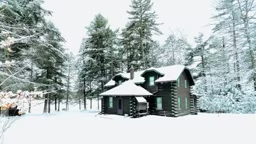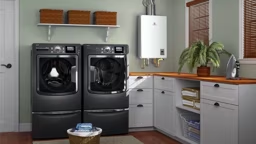Log homes are reliably energy efficient, but that achievement goes beyond the logs. Improvements in other building materials and developments in log home construction methods to bolster the energy efficiency of logs while retaining the home’s log look have improved home comfort and lowered heating costs.
Each month in our Log Home Living Newsletter we will feature one question and answer. If you're not already receiving our weekly newsletter, you can sign up here.
We'll archive all the questions on this page for easy reference and if you've got a question, please email Amanda at aphillips@aimmedia.com.Can Solar Add Resale Value to Your Log Home?
The maturing solar industry has been tracking the effect of solar systems on home sales and there's some compelling data availabe . Click here to learn more.
Should I consider radiant heat for my log home?
Radiant in-floor heating can be a fantastic option for a log home for several reasons. Check them out here.
What methods for energy savings can be employed by the log home supplier?
Following the building code requirements will address about 90% of your log home's energy efficiency requirements. In fact, there are two codes your builder should be intimately familiar with: The International Residential Code (which is the basic code for all residential construction) and the ICC-400 Standard for Log Home Construction. The latter is the bible for proper log home assembly and sealing, and, if followed, will make your house energy efficient. This includes how to attach log walls to foundations and roof systems, sealants between log courses and at the corners, as well as window and door openings. Your builder should be checking at every stage of construction to make sure that it is exceeding the code requirements. Read the full article to learn more.
Should I ask for specifics on sealing the air penetration places throughout a house, such as windows, doors, attics, crawl spaces, where the roof meets the floor and unfinished basements? What do I need to know?
A universal truth of construction is that anytime you remove a portion of a wall, whether it's a window or a door, you create the opportunity for air infiltration. The same applies where the log walls stop and other structural components, like foundations and roofs, start. All of these joints and openings must be properly connected and completely sealed to create a tight envelope. Learn more here.
How much of a difference can an insulated garage door make?
Plenty! Investing in an insulated garage door can make the temperature as much as 10-12 degrees different than the outside. Read the full article to learn more.
What can I as the home owner do as far as design aspects to ensure energy savings farther down the road?
Watch this presentation from Katahdin Cedar Log Home's President and CEO, David Gordon. Click here to view Energy Saving Solutions for Your Log Home.
Which methods for energy savings need to be employed by the on-site builder?
Following the building code requirements will address about 90% of your log home's energy efficiency requirements. In fact, there are two codes your builder should be intimately familiar with: The International Residential Code and the ICC-400 Standard for Log Home Construction. The latter is the bible for proper log home assembly and sealing, and, if followed, will make your house energy efficient. This includes how to attach log walls to foundations and roof systems, sealants between log courses and at the corners, as well as window and door openings. Your builder should be checking at every stage of construction to make sure that it is meeting or exceeding the code requirements. Read the complete article here.
What are the pros and cons to choosing metal roofing?
For some people, a metal roof is a must to complete that classic log home style. As you're researching roof options, you'll no doubt read about the benefits of metal roofing, as well as the drawbacks. Learn more here.
Do you suggest conducting a blower door test and/or infrared screening to find problem areas throughout the home?
To find out just how energy efficient homes are, the Residential Energy Services Network developed the Home Energy Rating System (HERS). One way to measure a HERS score on a log home is with a blower door test. Learn more about this test here.
HERS (i.e., the "Home Energy Rating System") was developed by the Residential Energy Services Network (RESNET), a non-profit organization to help homeowners reduce the cost of their utility bills by making their homes more energy efficient. It's a comparative tool that rates a particular house as compared to an average home in the U.S. on a 100point-average scale. Since the HERS Index measures the amounts of energy consumed (an undesirable thing), a score lower than 100 means that it performs better than average when it comes to efficiency. Keep reading to learn more.
There are many things that can affect the quality and energy efficiency of your log home. One that is often overlooked is how dry or how much water there is in your logs. This is referred to as moisture content. The drying process takes place when wood exchanges moisture with air. The rate and amount of dryness depends on the relative humidity and temperature of the air. This moisture relationship has an important influence on the quality and performance of your log home. Read the complete article here.
Should we hire an Energy Rater?
As regular readers of this column would recognize by now, there are a LOT of options when it comes to increasing energy efficiency of a log home. But how do you know which options will work best for you? Hiring an Energy Rater can help. Learn more here.
Does “smart home” technology really increase your home’s efficiency, or is it just a gimmick?
If you’re concerned about energy efficiency, the first, most important step is to build a well-insulated and sealed log home and make sure it’s properly orientated on your land to take advantage of passive solar gain. But beyond that, what can a homeowner do to increase and maintain energy efficiency once their home is built? Smart home technology actually does have the answers. Read the complete article here.
Does the way my home is positioned on my land affect its energy efficiency?
The short answer is “absolutely!” Everyone is looking for ways to save money, and properly siting your home to take advantage of passive solar gain is one of the easiest and smartest ways to accomplish that goal. Keep reading for four options.
What are some easy elements I can plan in my home to increase efficiency?
Good question – and one we get asked a lot. There are two basic ways to give a log home’s energy performance a boost: through design and through materials. Learn more here.
Should I consider a geothermal system for my home?
Geothermal (harnessing the natural warmth of subterranean soil) is one of the most intriguing renewable energy options available, but few people understand how it works or how fruitful the benefits can actually be. To help you decide if it’s right for you, let’s look at the basics. Read this complete article.
Is air sealing your home as important as insulating your home?
Sealing your home against air infiltration is as important as insulating your home. If your home is not properly sealed, you will spend more money on cooling and heating your home than is necessary. Incomplete or improper sealing will also contribute to uncomfortable drafts and give insects and dust an opportunity to enter your home. Learn more here.
Should I consider solar panels for my log home?
If your planned log home location is in a highly remote area where bringing electricity in could be expensive or if you just want to be energy independent, solar panels may be the solution. Keep reading to learn more.
Sponsored by:







_11868_2023-04-27_10-18-256x288.avif)




